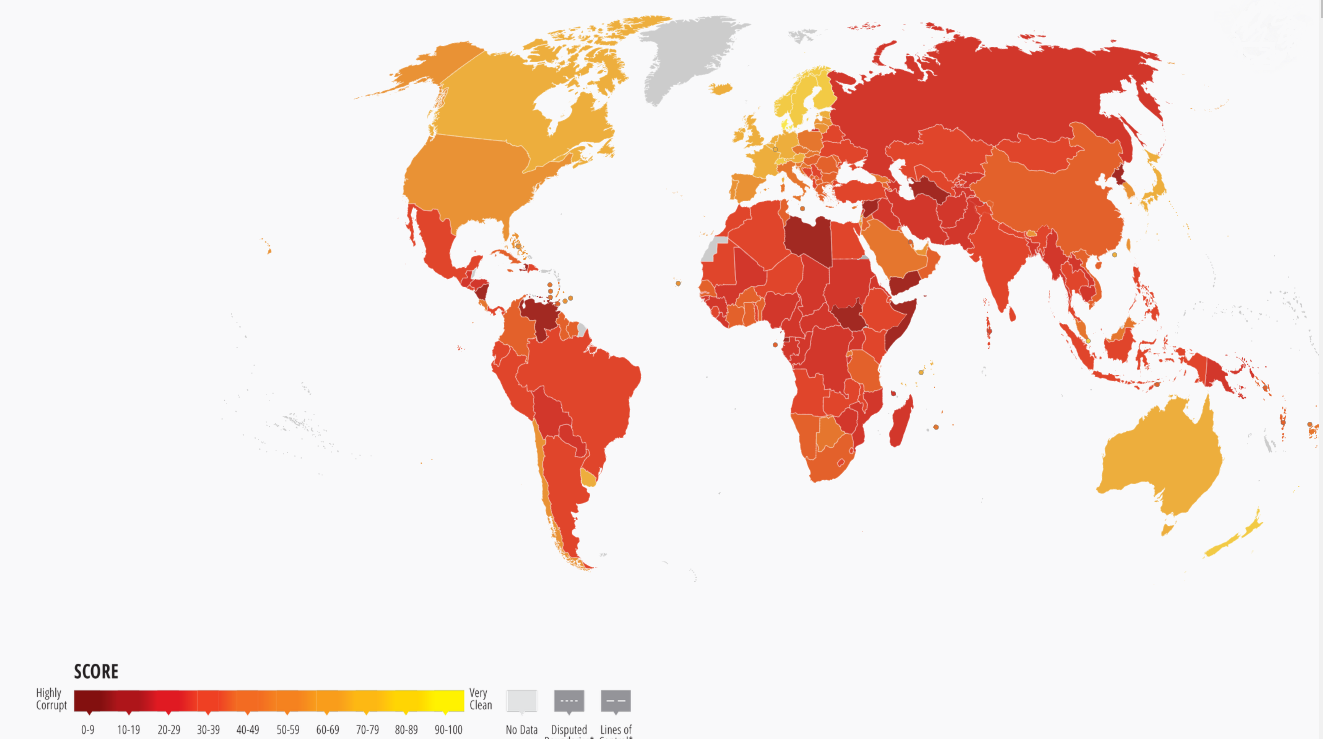Transparency International’s 2023 Corruption Perceptions Index (CPI) has unveiled troubling trends in global corruption, underscoring a significant deterioration in governance among some of the world’s leading nations. According to the latest findings, many countries continue to grapple with entrenched corruption at the highest levels of government and business, exacerbating public disillusionment and undermining democratic institutions.
The CPI ranks 180 countries and territories around the globe by their perceived levels of public sector corruption, scoring on a scale of 0 (highly corrupt) to 100 (very clean). This year’s index highlights how pervasive corruption is undermining governance and institutional integrity, with several high-profile nations witnessing severe declines in their scores.
Denmark was ranked the least corrupt country with a score of 90, followed by Finland (87), New Zealand (85), Norway (84) and Singapore (83).
Somalia was at the bottom of the list with 11 points, followed by Venezuela, Syria and South Sudan with 13 points each, and Yemen with 16 points.
Over two-thirds of countries score below 50 out of 100, which strongly indicates that they have serious corruption problems. The global average is stuck at only 43, while the vast majority of countries have made no progress or declined in the last decade. Also, 23 countries fell to their lowest scores to date this year.
The report indicates that while some countries have improved transparency and accountability, others are experiencing heightened corruption challenges. Particularly concerning are the findings related to countries that had previously been seen as leaders in anti-corruption efforts. These nations are now facing intensified scrutiny as recent scandals and lackluster reforms have led to growing concerns about the effectiveness of their anti-corruption measures.
Since the CPI scores became comparable in 2012, changes in the rankings of top-performing countries have generally been minimal. However, Ireland (CPI score: 77 out of 100) and Seychelles (71) have experienced notable improvements since 2012, having started from lower baselines of 69 and 52, respectively, compared to other high-ranking countries.
Conversely, some countries have seen a decline in their CPI scores. Australia (75) and Canada (76) have dropped by 10 and 8 points, respectively, since 2012. Additionally, compared to their scores in the 2015 CPI, Austria (71), Luxembourg (78), Sweden (82), and the United Kingdom (71) have all shown significant declines.
The 2023 CPI also sheds light on the rise of corruption in emerging economies, where weak institutions and political instability are creating fertile ground for corrupt practices. In these regions, corruption is not only impeding economic development but also contributing to a cycle of poverty and inequality.
Transparency International’s report emphasises the need for a renewed commitment to anti-corruption initiatives and stronger enforcement of laws to combat corruption at all levels. The organization calls for increased transparency in political financing, greater accountability in public procurement, and more robust whistleblower protections to tackle the pervasive issue of corruption.
“Corruption will continue to thrive until justice systems can punish wrongdoing and keep governments in check. When justice is bought or politically interfered with, it is the people who suffer. Leaders should fully invest in and guarantee the independence of institutions that uphold the law and tackle corruption. It is time to end impunity for corruption,” said François Valérian, Chair of Transparency International.
